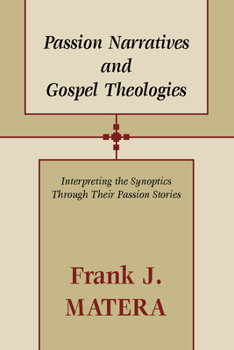Passion Narratives and Gospel Theologies
Although the passion narratives of the synoptic gospels can be read as free standing narrative, each one of them is the goal and climax of the Gospel story that precedes it. In Passion Narratives and Gospel Theologies, Frank Matera describes the intimate relationship between the theology of each of the synoptic gospels and its passion narrative. Matera's study of the Markan passion narrative in light of the Gospel's theology shows that no one can confess that Jesus is the Son of God until he or she acknowledges Jesus as the crucified Messiah, and no one can be Jesus' disciple unless he or she accepts the scandal of the cross. While the Gospel of Matthew continues to develop the great themes of Mark's gospel, Matera argues that its passion narrative manifests a distinctive ecclesiological and ethical outlook in light of its unique gospel theology. Finally, Matera demonstrates how the Lukan passion narrative, by presenting Jesus as a model of innocent suffering, also contains a distinctive outlook in light of its gospel theology: God's righteous suffer afflictions by trial and persecution. Comprehensive in scope and clearly written, Passion Narratives and Gospel Theologies provides a much needed introduction to the synoptic passion narratives and the theology of each evangelist. It will be welcome by students and pastors.
Format:Paperback
Language:English
ISBN:B00266XU1W
ISBN13:9781579106782
Release Date:June 2001
Publisher:Wipf & Stock Publishers
Length:268 Pages
Weight:0.70 lbs.
Dimensions:0.6" x 5.9" x 8.4"
Customer Reviews
1 rating
Matthew's Gospel, The Catholic Biblical Quarterly 1987
Published by Thriftbooks.com User , 22 years ago
'The Plot of Matthew's Gospel," The Catholic Biblical Quarterly, Vol. 49, No. 2/April 1987, pp. 233-253.In this article Matera, a Professor of New Testament at the Catholic University, shows that the Gospel of Matthew has a plot. His arguments for this conclusion are 1) a plot consists of events placed in a timely and orderly fashion, 2) the events in Jesus' life are placed in a timely and orderly way in Matthew. By the term 'plot' Matera means "the arrangement of incidents." (p. 235). Having defined 'plot', Matera is ready to uncover the arrangement of events in the gospel of Matthew. First he makes a distinction concerning two kinds of arrangements. Second he identifies the kernels in Jesus' life. Third he applies both kinds of arrangements to Matthew. As a result, this scholarly study of a plot in Matthew is expertly investigated and convincing. Matera writes that the plot according to time shows that it is possible that Israel will reject Jesus as the Messiah. By the middle (11:2-16:12), it is probable that Israel will reject Jesus as the Messiah. By the end, it becomes necessary that Israel rejects Jesus as the Messiah (21:1-28:15) (p. 239).





